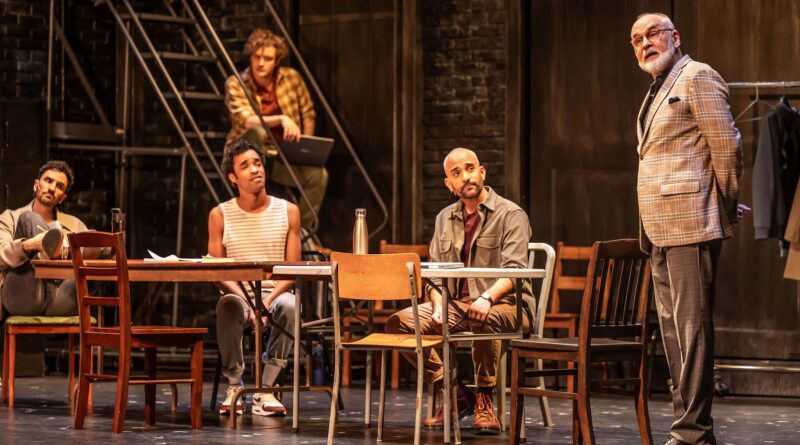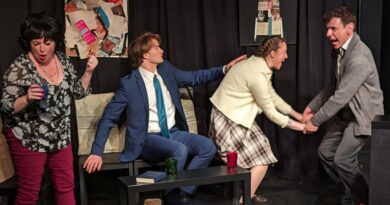“The Inheritance”: A sprawling, stunning saga of love, loss, legacy
The Canadian Stage production of The Inheritance Part 1 & Part 2 written by Matthew Lopez and directed by Brendan Healy, is a sprawling and absorbing six-and-a-half hour journey through time, space, emotion — and story. The show is a testament to the power of theatre to explore, illuminate, and celebrate the human condition in all its complexity. The Inheritance is a story of love, loss, and legacy, of the bonds that connect us across generations, and of the enduring power of storytelling to heal, to inspire, and to bring us together. Under Healy’s visionary direction, watching it is a profound, moving, and ultimately uplifting experience that leaves an indelible mark on the heart and mind.
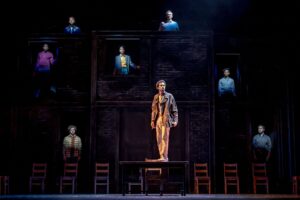
The Inheritance masterfully transposes the essence of E.M. Forster’s 1910 novel Howard’s End — famously brought to film screens by Merchant-Ivory in 1992 — into this two-part theatrical experience focused on the lives of a contemporary intergenerational group of gay men in New York. Lopez’s epic does not simply adapt or update the classic novel with its focus on three intersecting families: the rich capitalist Sinclairs, the intellectual middle-class Wilcoxes, and the impoverished Basts. It reimagines the novel entirely: exploring the implications of class and generational divisions within the gay community, and re-thinking the story’s meaning as a coded or refracted creation of its then-closeted gay author EM Forster.
In the process, The Inheritance delivers two powerful goods. First, it provides a vital, compelling, frequently funny and often surprising theatrical experience. Second, it breathes new life and hope into the novel’s themes of connection and inheritance, and situates the eternal quest for understanding and acceptance within the context of modern struggles and triumphs.
The play is wildly ambitious, and the production is consistently engrossing. At the heart of The Inheritance is an exploration of storytelling: how we craft our narratives, how we choose where to begin, how we find the connections and form the linkages we need to continue, and under whose influence we shape and end our growing tales. In service of this focus, the narrative meta-theatrically brings the character of Forster himself to the stage. “Morgan,” as he is affectionately known within the play, is played masterfully by a dry, droll, sometimes wistful Daniel McIvor. He is guide, mentor, and muse to the play’s main characters (all gay men) as they navigate their complex, intertwined lives.
At various moments, they acknowledge his outsized influence and conflicted legacy as an author who lived until 1970 – but published only posthumously his sole gay-themed book Maurice, first written just three years after Howard’s End in 1913. The characters accept their full inheritance from Forster: the shame and struggle he lived, as well as the guidance, affirmation, correction and reflections he offers them. This bold act of reclaiming and telling a story about – and with – Forster, allows the play to delve deeply into the mechanisms of storytelling. And it highlights the special importance to the gay community of history, legacy, and the creative act of using story to pass down wisdom and experiences across generations.
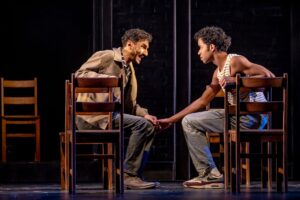
And The Inheritance never lets you forget that it is a deliberate act of storytelling and meaning-making. It’s not just Forster: all of the characters are narrated into existence at the start. . . and at times, they lapse directly from dialogue into shorthand, time-telescoping narration of their own or others’ thoughts and actions. This narration employs stilted, novelistic language that teeters on the knife-edge of triteness and, at the play’s end in particular, mawkish sentimentality. But the bottom line is clear – and ultimately exhilarating: we are not simply watching a story be told. We are participating in the act of claiming and creating stories, through which these characters and the larger community can discover, share and build enduring inheritances.
Despite the distancing effect of this focus on story, Healy’s astute direction ensures that each scene, transition, and emotional beat resonate with authenticity and impact. Metatheatrical flourishes and performative narrative choices clear space for the crackle and hum of the main characters’ interactions. In these moments especially, the actors shine. Stephen Jackman-Torkoff disappears into the speech, stances and yearning of youth. He plays dual roles as privileged actor Adam and impoverished street kid Leo – both of whom are struggling mightily to understand their inheritance, value, and life trajectory. Antone Yared’s writer Toby Darling is a magnetic, swaggering train wreck powered by ego, artistic aspiration and shame. The Inheritance finds in him its deliberate (yet randomly chosen) starting point, and his complex origin, motivations and legacy drive much of the plot and its aftermath. Jim Mezon’s steady Henry Wilcox is a sane and sincere rarity: an older gay man who not only survived the AIDS epidemic, but became a successful and decidedly conservative businessman.
And Qasim Khan is a compellingly natural, earnest and unfussy Eric Glass. Engaged to Darling when the play opens, Glass is The Inheritance’s central character. He acts as (forgive the pun) straight man to his more flamboyant fiance and friends, and is repeatedly told by other characters that he needs to learn his worth and step into his power. How he does this centers the play and cements the idea of inheritance as a product of generation, class, community, experience and bequest. A crackerjack ensemble of Salvatore Antonio, Aldrin Bundoc, Hollywood Jade, Breton Lalama, Landon Nesbitt, Ben Page, and Gregory Prest round out the picture – they move balletically in and out of roles as Glass and Darling’s unnamed individual friends, and as members of a chorus of observers who comment on the action.
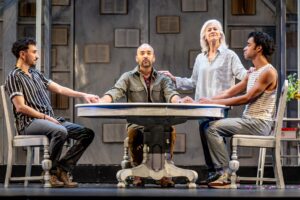
The cast (which includes the great Louise Pitre in a Part 2 role that widens the lens to consider the families of victims of the AIDS epidemic) navigate the challenging material with grace, depth, and an unerring commitment to their roles. They bring to life the joys, sorrows, loves, and losses of these characters with moments of breathtaking intensity. And the chemistry among them adds a tangible layer of authenticity to their interactions, creating a shared space of vulnerability and strength that underscores the core themes of community and belonging.
The production design complements the ambitious narrative beautifully, with minimalistic staging that shifts effortlessly between time and space, allowing the focus to remain on the actors and their storytelling. Kimberly Purtell’s lighting design and Richard Feren’s sound design are particularly noteworthy, providing a shifting atmospheric backdrop that enhances the emotional depth and thematic resonance of the play.
The structure of the play, which is divided into two parts, mirrors the complexity of the lives this talented cast portray. The first part clocks in at three hours and 15 minutes, and the second at three hours and 20 minutes. Each part is divided into three sections separated by two intermissions. My one quibble is that in the second section of Part 1 and the first section of Part 2, the action grinds to a halt for extended political and historical debates. Both scenes are elaborate brunches hosted by Eric. They feature long, passionate and intellectually interesting — but theatrically static – arguments about the gay community’s treatment by the American government, business and people. Dense, talky and borderline preachy, these are moments – unleavened by the kind of metatheatrical flourishes which elsewhere provide tension-cutting humour and insight — when the story’s transplanted context threatens to overwhelm the story.
But none of this is to deny the importance of the subject. Central to The Inheritance is its focus on the AIDS crisis and its lasting impact on the gay community, a theme that is handled with sensitivity, respect, and a refusal to shy away from the harsh realities of the epidemic. The exquisite and moving scene that closes Part 1 brings this home with the effect of a gut punch inside a loving embrace. And Part 2 celebrates the resilience, courage, and love that emerge from this long-form tragedy. In today’s era of populist backlash against the gay and trans communities, The Inheritance leaves audiences with a message of hope and renewal: at the end, it zooms novelistically out from the present moment to conjure the broader arc of progress – and inheritance – bending through generations into a future of redemption, justice and health.
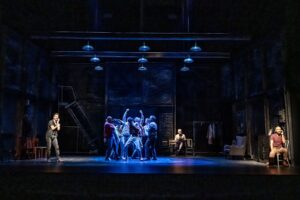
This production might itself be called an inheritance: an immersive gift of understanding, compassion, and humanity that is being shared with the audience. The Inheritance Part 1 and 2 is a clarion call to remember our past, cherish our present, and forge our future with intention, love, and the courage to tell our own stories. It feels like a vital and beautiful piece of theatre centering the gay community – and for anyone who has ever sought to find their place in the vast tapestry of human experience.
The Inheritance is on stage at the Bluma Appel Theatre until April 14, 2024. Reserve tickets here.
© Scott Sneddon, SesayArts Magazine, 2024
About The Author
Scott Sneddon
Scott Sneddon is Senior Editor on SesayArts Magazine, where he is also a critic and contributor.
Visit About Us > Meet the Team to read Scott’s full bio …

